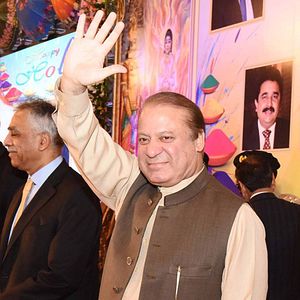An anti-corruption court in Pakistan has sentenced the country’s former prime minister, Nawaz Sharif, to seven years in prison in a case associated with the Panama Papers corruption scandal. The decision has come after about two years of hearings and investigations. Previously, in another corruption-related case, Sharif was disqualified from the premiership. Irrespective of the court’s decision, which is being seen as controversial, the verdict will have far-reaching implications for Pakistan’s politics.
Sharif’s party, the Pakistan Muslim League Nawaz (PML-N), has been under pressure for some time due to its anti-judiciary and anti-military politics. Pakistan’s last general election was mired in controversy as it allegedly lacked objectivity and fairness. Sharif’s party, which was poised to win the last general election in Pakistan, lost not only at the federal level, but also in its political stronghold, the province of Punjab. The Pakistan Tehreek-e-Insaaf (PTI) has been the direct beneficiary of the court cases against the PML-N’s leadership, with its leader, Imran Khan, now at the helm of Pakistan’s government. The party’s unanticipated rise to the national level is widely described as the result of a general consensus in Pakistan to isolate Sharif’s politics and his political party.
For many, the verdict in Sharif’s case is a continuation of a systemic effort to undermine the politics of the former three-time prime minister in Pakistan. Sharif’s party and other political forces that are facing corruption-related cases only see the ongoing accountability as political victimization rather than the dispensation of justice. Regardless of whether there is a systematic effort to contain the politics of the PML-N, the court cases and their verdicts are not going to be able to terminate Sharif and his party’s politics in Pakistan.
While the PML-N’s legal cases are being fought in the courts, the political implications of these events will have national-level impact. Sharif’s political party is expected to lead an agitation campaign against the government and courts in the aftermath of the decision. Sharif’s daughter, Maryam Nawaz, who in the past has assertively criticized the country’s courts and the ruling party for their collusion against her father’s politics, is likely to lead the campaign. Maryam has been quiet for some time, mainly after her mother’s death, which also took place in circumstances marred with political intrusions. However, she has again begun to talk about the alleged victimization of her family. If Maryam becomes actively engaged in politics again, the PML-N still has a support base and the street power necessary to weaken the government. Moreover, it’s expected that other opposition political parties are likely to support the PML-N in its effort to lead the agitation as many of them also face the same pressures at the state level.
Meanwhile, the dominant forces in Pakistani politics today, including the PTI, see the verdict as a natural outcome in a case that should have been settled a long time ago. For now, the PTI appears to be the political winner of the decision: the prison sentence of Sharif and corruption related cases against other opposition political personalities will further dampen the efforts of the opposition political parties when it comes to any challenge to the ruling party’s power.
Whether Sharif wins his freedom in the review case or goes to prison for seven years, Pakistan will see the resurgence of political instability in the coming weeks and months. If the PML-N and other political forces are to make a comeback in terms of their political relevancy in Pakistan, the only way forward is to give the party in power a tough time inside and outside the parliament.
There is a clear argument against the decision of the court in the form of a lack of accountability of political personalities that are in power. A number of politicians who are part of the PTI have not only been named in various corruption-related scandals, but have also been summed in courts in money laundering cases. Inaction on the part of the country’s courts when it comes to following corruption-related cases against political figures of the government shows that there is a political side to the ongoing accountability against Sharif and other opposition figures.
This doesn’t bode well for Pakistan’s true democratic future as the ongoing situation points toward a context that only leaves political forces in the country on the losing end of a struggle.
































